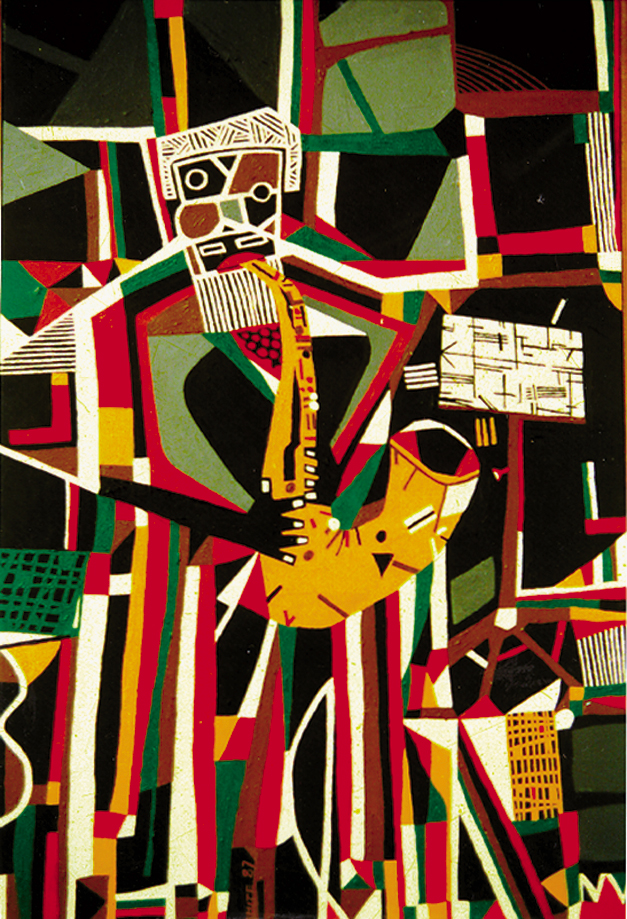Short story by George Wynn
[dropcap]H[/dropcap]ank walks down a narrow alley carrying a suitcase and bedroll. It is still light out as he comes out onto Larkin Street and passes a Vietnamese sandwich shop and a Vietnamese restaurant, and then goes over to observe the stone lions welcoming folks to Little Saigon.
He walks down Eddy Street and sees an opportunity and follows an elderly Asian lady who leaves a tinge of the door open as she enters her building. He walks up to the roof. After he lays down his pack and bedroll, he takes long, deep breaths to calm his shaking hands.
Borderline Parkinson’s, the doctor at the free clinic by the Civic Auditorium said. Hank dropped off his horn at a South of Market pawnshop this afternoon. No use struggling to play with trembling fingers.
He puts on his headphones and turns the walkman on to KCSM, the Bay Area’s jazz station. A smooth and sweet Duke Ellington-Jimmy Blanton piano-bass duet elicits a lusty, “Oh yeah!” from smiling Hank. He scans the roof: no clothesline. Not many people come up here. Maybe he can get some solitude and some good nights’ sleep.
Hank looks out over the roof, seeing the Tenderloin below. People walking around, with beaten and hostile faces, arguing in the streets, free as pigeons fighting for scraps.
Jazz expands space in his head. His brain riffs with new possibilities. He can imagine himself as a man on edge with a cue stick suddenly presented with a gift of creative angles from a bottled-up position on the velvet green of a billiard table.
He remembers how he wound up on this roof. He had been listening to some cats older than him blow in New Orleans’ Louis Armstrong Park, the sounds mellowing him out, imagining railroad cars, first in slow motion, then speeding up.
The thought of “Gotta get away, gotta take a chance… even if it’s a slim one,” wouldn’t leave him. The next day, Hank said good-bye to New Orleans and boarded an Amtrak train headed for the San Francisco Bay. It was his first venture outside the South, other than his stint in the service.
Hank had made a small living, very small, playing horn. Most of his gigs were little night clubs in New Orleans. Now and then, he’d have a nice payday doing studio work as a sideman in bigger ensemble bands. Technically he was only fair, but he had a great feeling, and was a good accompanist.
Hank sleeps well his first night on the roof in the Tenderloin, then eats his meals at St. Anthony’s and Glide, and strikes out looking for work in pizza shops and fast food places. He keeps his spirits up by hearing a jazz soundtrack in his head. It gets him in motion and prevents brooding.
He sleeps well his second night on the roof, relaxing to a cool, pretty Roy Eldridge trumpet solo, “Rocking Chair.” Later Charlie Mingus’ bass closes his eyelids.
It rains the next two days, but he is prepared with a poncho that an attractive Creole woman, the love of his life, who passed on two years ago, gave him on his 66th birthday.
He hates the thought of a shelter and being walled in. Hank can sleep anywhere. He’s done special training in snow mountain country in the service.
That night, Hank dreams about a white man pummeling him to a bloody pulp. He wakes with a start, remembering when he was an exhausted kid who lost his water bottle on a scorching hot Little Rock day and didn’t know any better and sat down in the white section of the bus. A big white man kicked him in the privates.
Man alive, what pain! Bastard musta wore a size 13 at least!

Even though he has no luck finding work, he can’t wait each day to follow the sky up to the open air of the roof and listen to jazz. One night he’s startled by the opening of the roof door and covers his eyes from the blaze of flashlights.
“SFPD,” announces a big, bespectacled cop. “We got a phone call about a suspicious person on the roof.”
Another big cop moves toward him, the spitting image of the man in Little Rock who kicked him in his private parts.
“This ain’t my town,” says Hank under his breath.
“What are you doing up here?” demands the cop.
“I don’t know sir,” says Hank. “I was trying to get some sleep and listen to jazz.”
“You’re trespassing. This is private property, plus you can’t sleep outside in this city.” The bespectacled cop writes out a ticket and hands it to Hank, who stuffs it in his overcoat pocket. “We’ll escort you downstairs.”
Once back down on the street, spitting image says, “You’re free to go, but next time it’ll be the county jail.”
Now Hank walks back from the French Quarter, where he plays trumpet for pocket change on the street. Work is sparse in this economy. The shaking in his hands that started in San Francisco mysteriously disappears once he’s back in New Orleans. He passes by Louis Armstrong Park. The same cats are still blowing.
“Hey Hank,” yells the sax player, the ace of the bunch. “Hear you spent a week in San Francisco. I played at the Blackhawk on the corner of Turk and Hyde Street in ‘63. It was great!”
Hank doesn’t say anything. He grips his case, holding his horn extra tight and walks off down Rampart Street.
